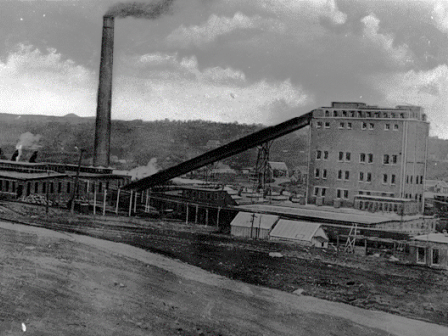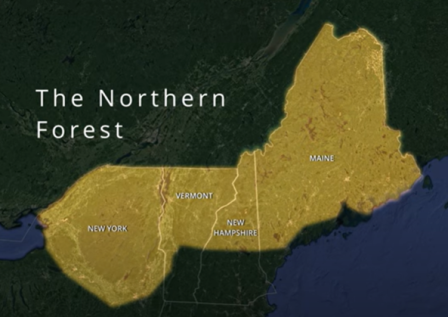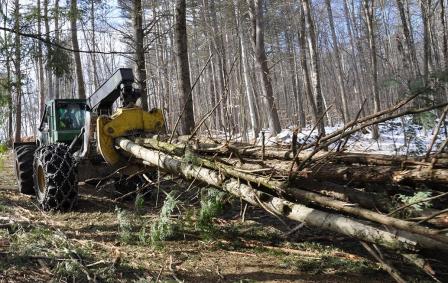
EDA Helps the Wood Products Industry Branch Out in the Northern Forest
Timber markets are one of America’s most valuable, yet unpredictable, natural resource industries. It is no stranger to volatility, going from boon to bust and back again. As recently as 2019, paper mills and biomass electric plants were closing in Maine, New Hampshire, New York and Vermont, a four-state region collectively referred to as the Northern Forest. As the plants continued to close, the demand for wood harvested in the region began to decline.
There were those within the industry who sought to expand the market for the production of wood products, particularly in those communities where a mill closed its doors, taking jobs that employed the community for generations. Included among them was the Northern Forest Center (the Center) based in Concord, New Hampshire.
Back in 2018, the Center was looking to diversify the wood market throughout New England. They applied for funding with the Economic Development Administration (EDA), who provided a $3 million award through the Economic Adjustment Assistance program.

The award established the Future Forest Economy Initiative (FFEI), a cooperative agreement between EDA, the Center, and the U.S. Endowment for Forestry and Communities (the Endowment), who served as fiscal agent for this project. Its goal is to increase production, commercialization, and use of wood products throughout the region.
“This award was a great way to get the ball rolling and find projects to bring catalytic funding to the region,” said Alicia Cramer, Vice President of the Endowment. “We’re now at the end of our five-year award cycle and we’re seeing the positive results it has had for our community, as new businesses are growing throughout New England.”
With funding secured, the network began engaging the business community and offering support. They hosted a regional wood heat summit for 70 organizations to foster collaborative discussions to develop wood heat opportunities and market demand. They also conducted one-on-one conversations with business owners across the four-state area to help identify the challenges they were facing in the wood products industry.
“We did our due diligence with the grantees and helped them get their finances in order,” said Rob Riley, President of The Center. “We went into the forest, if you will, to help expand the markets for wood. The EDA award is a different type of investment, helping to unlock what’s coming next.”
For those who wonder how far $3 million can go, just ask the cooperative. According to their figures, the EDA award helped provide direct services to 15 companies, communities, or economic-development organizations, which enabled them to increase their capacity and ultimately benefit nearly 220 local businesses. It has generated nearly $15 million in private investment and strengthened more than 1,500 jobs in the wood production industry. It has even supported the development of ten new forest-related products, which will have a long-term economic benefit throughout the region.
FFEI’s grantees have developed some innovative approaches to diversifying the market. The State University of New York’s College of Environmental Science and Forestry received more than $160,000 to demonstrate the viability of using domestically grown and manufactured low-grade hardwood lumber to replace endangered tropical hardwoods currently in use by the military in trailers and vehicles.

Another grantee, the Trust to Conserve Northeast Forestlands, received a $395,000 award for two projects designed to enhance the market for certified wood and to strengthen the supply chain in the four-state region. It expanded a Master Logger Certification program, certifying 135 companies to the Master Logger standard. It also supported the expansion of mapping technology used within the industry.
FFEI has also supported mill redevelopment projects as well. A $440,000 award to the Somerset Economic Development Corporation supported one such project in Bingham, Maine. Not only will the project create 100 jobs for the community, it has also supported development of the first domestically produced poplar plywood, which will be a new market for landowners and loggers.
“The future of our forests depends upon diverse markets of wood,” Riley said. “We are creating viable products that consumers require that are creating value to people across the Northern Forest that are incumbent upon us managing our timberlands well.”
Cooperative members appreciate EDA’s support throughout the process, helping to deploy resources in the most effective way to develop a financial ecosystem.
“The EDA representatives were very approachable and knowledgeable,” Cramer said. “This goes back to the trust and the relationship that we have built over the last five years and the results speak for themselves.”
To read about other FFEI-funded projects, please visit northernforest.org. A 12-minute video about the program and many of the projects it has supported is also available on YouTube.
For more EDA success stories, please visit eda.gov.
